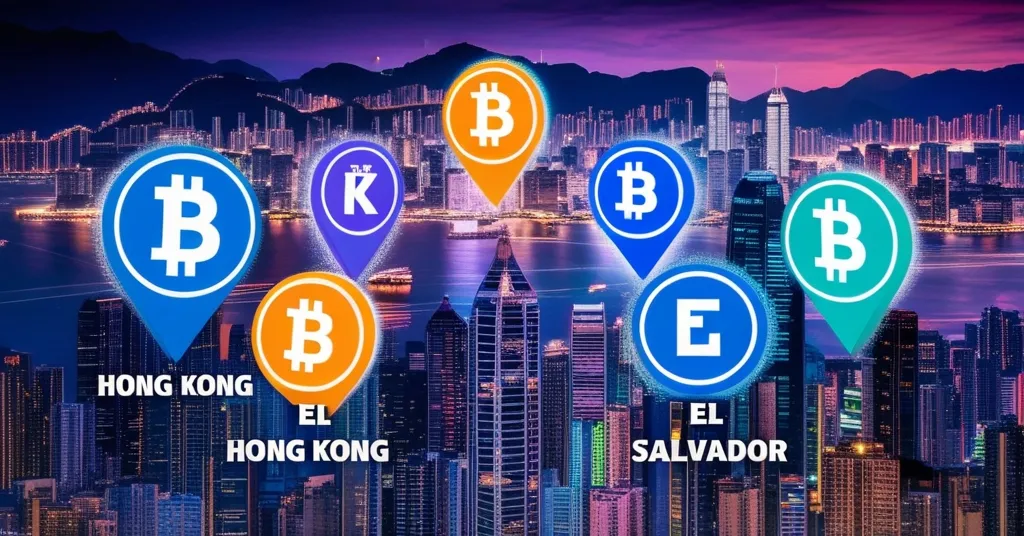Hong Kong and El Salvador Advance Blockchain with Tokenization Initiatives

Hong Kong and El Salvador Push Forward with Blockchain and Tokenization Initiatives
Hong Kong and El Salvador are making significant strides in blockchain and tokenization, aiming to stay ahead in the digital financial revolution.
- Hong Kong’s HKMA launches blockchain incubator for banks
- El Salvador’s Ditobanx partners with Tokeny for tokenization
In Hong Kong, the Hong Kong Monetary Authority (HKMA) isn’t messing around—they’re launching a full-blown blockchain incubator to get banks up to speed. The Supervisory Incubator for Distributed Ledger Technology, or simply blockchain technology, is designed to help local banks transition their blockchain products from experimental stages to full production. This isn’t just about playing around with new tech; it’s about making it work in the real world. The focus here is on risk management, tokenization (the process of converting rights to an asset into a digital token on a blockchain), and promoting best practices in the banking sector.
Arthur Yuen, HKMA’s Chief Executive, put it bluntly:
“As the banking industry continues to evolve, it is essential that we provide a supportive environment for innovation to thrive. The Supervisory Incubator for DLT is a key component of our strategy to foster the development of DLT-based banking solutions that are safe, efficient, and beneficial to the industry and the wider community.”
The HKMA has been busy. They’ve already launched a stablecoin sandbox and Project Ensemble, both of which have engaged big names like Standard Chartered, HSBC, Microsoft, and Animoca Brands. Carmen Chu, HKMA’s Banking Supervision Director, is all in on tokenization:
“Asset tokenisation offers a game-changing opportunity to facilitate more secure and transparent value exchange by enabling new forms of financial transactions.”
Meanwhile, El Salvador isn’t just flipping burgers; they’re flipping the financial script with tokenization. Ditobanx, a local fintech firm, has teamed up with European firm Tokeny to advance the country’s tokenization efforts. They’re gunning to issue up to $300 million in tokenized assets this year. Guillermo Contreras, Ditobanx’s CEO, knows it’s not easy, but he’s committed:
“Launching tokenized assets is a complex process, but it is essential for the future of our industry. We believe in making this journey easier for others by sharing what we’ve learned and providing access to proven solutions.”
El Salvador’s parliament passed the Digital Assets Law in 2023, providing a favorable regulatory environment for digital asset firms, including tax breaks. Ditobanx already has 22 clients lined up for its tokenization services, showing that the country’s blockchain ambitions are more than just talk.
While the enthusiasm is palpable, critics argue that these initiatives may face significant regulatory challenges that could slow down their progress. Let’s be real—tokenization is a game-changer, but it’s not a walk in the park. The complexity of launching tokenized assets and the need for effective risk management as they transition to production are hurdles that can’t be ignored. Yet, the potential for more secure and transparent value exchange and new forms of financial transactions is undeniable.
Both Hong Kong and El Salvador are navigating the complexities and opportunities presented by tokenization. Hong Kong focuses on enhancing its banking sector, while El Salvador takes a broader approach to leverage blockchain technology for economic development. These efforts align with the values of decentralization and privacy, key themes in the crypto landscape. They also resonate with the concept of effective accelerationism (e/acc), pushing for rapid technological advancement.
From a Bitcoin maximalist viewpoint, while Bitcoin remains the king of cryptocurrencies, these initiatives show how blockchain technology is expanding beyond BTC to innovate in various sectors. Bitcoin might not serve all niches well, but it’s the foundation that’s enabling these advancements.
The journey towards widespread adoption of blockchain and tokenization is complex, yet the potential rewards are significant. As these technologies continue to mature, the crypto community must remain vigilant, critical, and engaged to ensure that the promise of decentralized finance becomes a reality. Hong Kong and El Salvador are paving the way, but the road ahead requires careful navigation and a no-bullshit approach to truly revolutionize finance.
Key Takeaways
What is the purpose of the Supervisory Incubator for Distributed Ledger Technology launched by the HKMA?
The purpose is to help local banks transition their blockchain products from experimental stages to full production, focusing on effective risk management and the adoption of tokenization.
How are Standard Chartered and HSBC contributing to Hong Kong’s tokenization efforts?
Standard Chartered and HSBC are participating in HKMA’s initiatives, such as the stablecoin sandbox and Project Ensemble. HSBC has also been issuing digital bonds, furthering Hong Kong’s tokenization ambitions.
What is the significance of Ditobanx’s partnership with Tokeny in El Salvador?
The partnership aims to establish a standardized framework for tokenized regulated assets in El Salvador, with Ditobanx planning to issue up to $300 million in tokenized assets, supported by Tokeny’s infrastructure.
How does El Salvador’s Digital Assets Law support tokenization efforts?
The Digital Assets Law passed in 2023 provides a favorable regulatory environment for digital asset firms, including tax breaks, facilitating the issuance and management of tokens in El Salvador.
What challenges and opportunities does tokenization present for banks and financial institutions?
Tokenization offers opportunities for more secure and transparent value exchange and new forms of financial transactions. However, challenges include the complexity of launching tokenized assets and the need for effective risk management as they transition to production.



